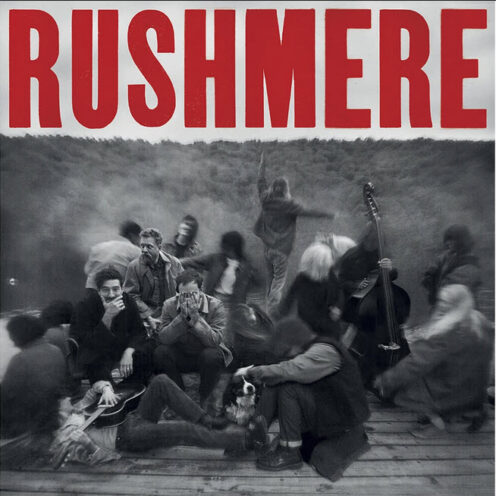
The fifth studio album from Mumford & Sons, and the band’s first new album in nearly seven years, called Rushmere, gets its name from the pond located at Wimbledon Common in London, where the band first met and began the process of wanting to make music together. The band looked towards their beginnings to find a spark in their music, and create their first new taste of music since Delta. The overall sound of Rushmere recounts the humble beginnings of Mumford & Sons on 2009’s Sigh No More, with more experience under the band’s belt in crafting their desired artistic direction. The set was produced by veteran hit-maker Dave Cobb (Sturgill Simpson, Jason Isbell) and was recorded partly in Nashville, and also in the band’s home studio in Devon, England. Rushmere takes all of the stage and life experiences that the band members have had, and gets the ship pointed in the right direction. The next phase of Mumford & Sons career looks bright.
The album gets off to a cautious start with a quietly strummed guitar by Marcus Mumford, before his voice gradually gets louder in his delivery. “Malibu” was the second single to be released from the set, and it ends up being a nice re-introduction to the band. In the chorus of, “You are all I want / You’re all I need / I’ll find peace beneath the shadow of your wings,” Marcus Mumford regains his footing and makes for a memorable opening statement. The banjo is prominently back in the forefront of Mumford & Sons musical delivery, and it makes sense in the placement of the instrumentation here. “Caroline” follows the nice opener with some more forceful vocals from Marcus Mumford, while the rest of his bandmates rally around the music template set forth early on. The second verse of, “For years we’ve secretly been dreaming / But the words you write have lost all of their meaning / You wanna pour me out then drink me up off of the floor / So you can say you’re a saviour, but I know you’re a fraud,” features some nice lyrical wordplay, and a comfortable reminder of the band many of us adored finding out about in 2009.
The title track was an easy choice of a lead single since it captures the overall vibe of the record in just one song. The chorus of, “Light me up, I’m wasted in the dark / Rushmere, restless hearts in the end / Get my head out of the ground / Time don’t let us down again,” finds the frontman re-discovering the magic in his band’s music as he gets back to the place where it all began. The key track in the set gets back to what the band has always done best, and they write a nice, honest song here.
”Monochrome” is a quiet song that never really accelerates to the finish line. Instead, the track adds some more context to the vibe the band was going for on Rushmere, and provides the “campfire” moment in the set. Luckily, the band doesn’t get too comfortable in this sound as they beef up their approach on “Truth.” This particular song would’ve fit well on their Wilder Mind record since it features a more rounded out rock type of track that sounds bigger than what most of the band’s catalog does. When the full crescendo kicks in after one of the last choruses, you can tell that the band is very cozy in this type of rock song that still has its roots in indie-folk.
”Where It Belongs” is structurally similar to “Monochrome” with its chorus of, “When you speak, do you think you could do it kindly / Or does your anger overwhelm? / When you’re weak, do you ever think of living wildly / And let your anger go to hell / Where it belongs?” and ends up not covering too much new ground. “Anchor” follows the quiet song with a bit more bass-heavy sound, but the band once again gets too comfortable in this sleepy track that is over before it can really go anywhere.
”Surrender” allows Mumford & Sons to pick up the pace in a much-needed way as the second verse adds in some lyrical context as Marcus explains, “I cry havoc / Before you could know / Now I’m ready to pay the debt that I owe / And it’s violent work / There’s some death on the vine / I know that I’m walking a treacherous line.” The second chorus features more of a sense of urgency in its delivery and makes for another memorable moment on Rushmere. “Blood on the Page” features some guest vocals from Madison Cunnigham, and she carefully croons with Marcus in key spots of the track. The song feels like a old school type of folk track that would’ve been found on a Simon & Garfunkel album, but it didn’t do too much for me in this spot. It’s well-written, but it gets a little too comfortable in the quieter vibe.
”Carry On” closes out Rushmere on the right note and feel with as Marcus opens with the vivid lyrics of “If this is what it’s like to be unholy, man / If this is what it’s like to be lost / I will take this heresy / Over your hypocrisy / And count any cost,” before moving into a similar second verse and an uplifting chorus. The song tips the scales of Rushmere towards the positive side, but the middle section of the LP is still a bit hard to get through at times due to the soft-spoken vocal delivery and similar-sounding songs. However, Mumford & Sons have reinvigorated their own interest in making music together again, and that’s a wonderful thing.
 Malibu
Malibu